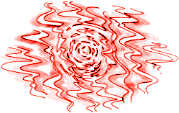
The Big Change
Every day for as long as you've lived, your body has been performing the beautiful, complex, intricate function of maintaining your life. Now your body has another life to contain and sustain, and it's building a whole new biological system for that purpose.
This is no small thing for your body, even—and especially—in the earliest days of pregnancy. Your entire chemical-hormonal balance is shifting to accommodate new life. Little of your physical substance is yet going into forming your baby, but the shifts are so great that nothing you feel ought to surprise you.
Some women experience no "symptoms" and simply feel good in their first month of pregnancy. Some start out feeling a heaviness in their reproductive organs that feels like their period is coming any day. Some (probably most) feel vaguely ill, and think they have some kind of flu. And some feel really sick, up to the point of wondering if they have some terrible illness.
Wherever you fit in the above range, you're likely to feel the standard fatigue of early pregnancy and perhaps the nausea ("morning sickness") that we discuss next month. You may well feel unusual hunger and soreness in your breasts, and/or the need to urinate a lot.
Whether your experience of this month is stressful, blissful, or somewhere in-between, you and your baby are beginning a great journey. Every consideration you give to yourself on this journey is consideration for your baby as well. So it's a good time to get in the habit of resting and eating well.
Old patterns of ignoring hunger, fatigue, and other indications of your body's immediate needs must start to give way now to close listening and responding to your body's demands.
Conception and After — Your Baby's First Month
The new life within you began with the amazing meeting of sperm and ovum (egg). The ovum was about four-thousandths of an inch, just big enough to be barely visible by the naked eye. It had just been released by one of your two ovaries and was being propelled down one of your two fallopian tubes on its way to your uterus (the womb). Had the sperm not been there to meet it in the fallopian tube, the egg would have been sloughed off in your next menstrual period, along with the uterine lining meant to nourish it.
But the sperm was there. Of the hundreds of millions released hours before, it was among about one hundred that made it to the vicinity of the egg. As soon as the one sperm began to penetrate the welcoming outer membrane of the egg, the membrane ceased to be welcoming, encouraging only the one to continue the journey to the ovum's nucleus. There, in an explosion of its previous form, the sperm poured its substance, its genetic heritage, into your ovum's own combination of genes and nurturing substance.
The scale of these events is hard to comprehend. The fertilizing sperm, only 3.9 millionths of an inch long, not only made the equivalent (to it) of a many-mile-long journey to the egg, but then penetrated a world eighty five thousand times its own size to reach its goal, the nucleus of the egg.
At first, the new life was one pair of cells, born of the meeting of sperm and egg and the mingling of the fifteen thousand genes in each nucleus. Ten hours later there were four cells, and after a week there were more than a hundred. This cell cluster was still smaller than the period ending this sentence, and it was still housed in and bound by the membranes that originally held the single egg. But by the fourth or fifth day, the multiplying cluster of cells, resembling a microscopic mulberry, emerged from the fallopian tube into the uterus. And by the end of the first week it implanted there — nourishing itself on the tissue and blood released as it rooted itself into the uterine lining.
The "wound" created by the implanting process healed over the embedded cell cluster with a kind of scar tissue that acted as a protection for it. This is where the surrounding support system for your baby will remain anchored for the rest of your pregnancy.What is especially mysterious about the process described so far is that the cells into which the original two cells multiply are not simply replicas of the same cells over and over.
Some are smaller and will be responsible for the growth of supporting tissues in your womb such as the placenta. Some are larger and will produce the baby's actual embryo. And these larger cells will quickly become differentiated into three groups to begin the formation of the various systems of the new baby.
The mystery deepens throughout the first month. Within a few days of implantation the cluster of cells begins to become an embryonic human being — super-delicate, almost transparent and jelly-like in substance, but visibly on the way to form.In the third week, the body begins to unfold, into a long stalk of a spinal column from which the features of human form continue to emerge. There are spurts of creation.One day there is no sign of arms, two days later the swelling of arm buds are suddenly there and two days after that, the buds for legs.
By the twenty-fifth day since conception, a primitive heart is beating, and within a few more days it's circulating (sixty-five times a minute) the blood needed to nourish the embryo.
The heart is tiny, of course (the whole embryo is only a quarter of an inch by the end of the month) but in proportion to body size it's almost ten times the size of the adult heart.At the end of the first month, the embryonic body is still a fragile, jelly-like substance, but it pulses with, and powerfully illustrates, the tremendous will of life to be. It has a digestive tract, kidneys, and a liver in addition to its heart and bloodstream. And the embryo has a head with rudimentary eyes, ears, mouth and a brain that is already beginning to specialize.
The scale of events within a mother continues to be amazing all through pregnancy. (If a newborn baby grew at the same rate as when inside the mother, it would weigh much more than our entire earth by the child's twenty-first birthday.) But at no time is the scale of growth more amazing than in the first month, when coming from as near nothingness as human substance can get, the embryo reaches ten thousand times the size of the fertilized egg by the end of the month.
Meeting Yourself, Trusting Yourself
Pregnancy and childbirth bring you into situations that require you to make choices. good advice will help in many of those situations and of course you will want the best information you can get. But the core need is to get to know yourself and your instincts.
Pregnancy is a very natural and sacred time. Your body has infinite competence and knows how to be pregnant, how to have a baby. The signals from within your body, from your own life processes and from your baby, and the working intuition that develops out of your experience of life are the best guide you can ask for.
To be sensitive to your instincts and feel able to trust them while also listening to the sometimes far-louder advice and expectations of others, it's valuable to have time to be quiet and alone with yourself and the baby inside you. It can be when you do some stretching exercises or when you lie down to rest. It can happen for you when you listen to music, take a walk in the park, or experience a special few minutes you set aside everyday. Or very likely there may be times when you make a deep internal connection at an unexpected moment.
Even if you're usually too busy to take time to be still with yourself, this shift into a new phase in you life is so special that it can help you get to know and enjoy the real openness within you.
By all means ask around when you need to make decisions about the directions you want to take for yourself and your baby-to-be. Talk to Moms you respect. Do some reading. Get whatever information you can from people with real knowledge and experience. But always combine all that with your own intuition, and respect your own sense of how things are.
The better the tone of your body, your nutrition, your care of yourself in general, the more sensitive you will be to your internal signals, and the easier you will find it to act on them. But whatever shape you're in, the real you is there and worth meeting.

"Pregnancy and birth are processes — not products — and can no more be controlled than can the weather. Go along for the ride and trust your body to do what it must."

First Month
Year Of Birth Contents | Toward a Good Beginning | Second Month Intro
From The Beginning Home Page
All contents copyright © 1991 by Crystal Press. Used by permission of authors. Neither text nor illustrations may be reproduced in any form, in print or on the Intenet, without permission in writing from the authors, John Milder and Candie Snow, who may be e-mailed at taimilder@yahoo.com. You may also contact us at that address to purchase copies of Year of Birth.



